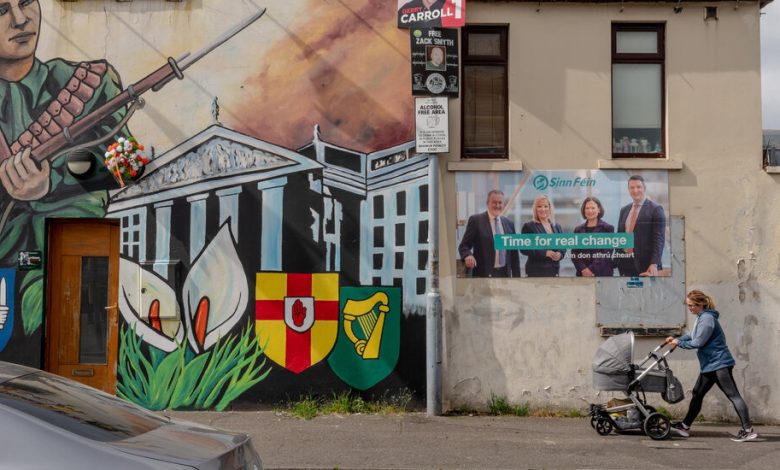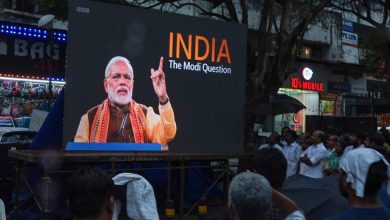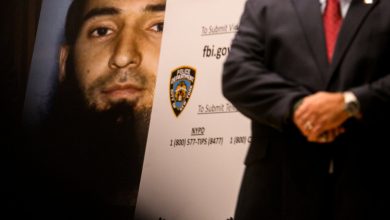Catholics Outnumber Protestants in Northern Ireland for the First Time

LONDON — For the first time, Catholics outnumber Protestants in Northern Ireland, census figures released on Thursday show — confirmation of a long-anticipated but still striking shift with implications for the region’s future.
The result could intensify debate, at an already politically fraught moment, about the region seceding from Britain and reunifying Ireland, but experts have also cautioned against equating religion with political affiliation.
“With Catholics coming out now in the plurality, that really is quite significant because of the grounds on which Northern Ireland was created to begin with,” said Katy Hayward, a professor of politics at Queen’s University, Belfast. “But I would immediately point to the dangers of reading political opinions on top of that.”
According to the census numbers, some 45.7 percent of Northern Ireland’s population is or was raised Catholic, while 43.5 percent are Protestant or raised in another Christian religion. Since the formation of Northern Ireland — which remained part of the United Kingdom when the island was partitioned in 1921, while the larger part of the island became an independent Irish state — Protestants have outnumbered Catholics.
Those who identified as currently religious were lower, with Catholics making up 42.3 percent of the population, Protestants making up 37.3 percent, other religions 1.3 percent and 17.4 percent indicating ‘No religion,’ pointing to an increasingly secular population.
“It changes the balance, more than a hundred years after Northern Ireland was engineered deliberately to have a Protestant majority,” said Theresa Reidy, a professor of political scientist at University College Cork. “It probably moves the conversation on Irish unity a little bit closer, but there is still a good deal that would need to change.”
The Good Friday Agreement, a key 1998 peace accord between the British and Irish governments and political parties in Northern Ireland, does have provisions for a referendum to potentially reunify the island, though it does not detail how that would work.
But the shifting demographics do existentially undermine the rationale behind Northern Ireland’s creation a century ago, when religion was considered a reliable indicator of support for either continued British rule or for a united, independent Ireland.
After World War I, the weakened British Empire faced an armed campaign for independence in Ireland. A strong majority in Ireland — mostly Roman Catholics who identified ethnically with the island’s original Gaelic inhabitants — supported independence. But in parts of the northeastern province of Ulster there was a regional majority of Protestant unionists, who remained fiercely loyal to predominantly Protestant Britain.
The British government agreed to withdraw from the nationalist south, which became an independent state, and the island was partitioned. Six of the island’s 32 counties were carved out to form Northern Ireland, where Protestants outnumbered Catholics by about two to one, and remained a part of Britain.
But nearly since its founding, Northern Ireland’s Protestant majority has been slowly eroding. At first, this was often attributed to the Catholic Church’s opposition to family planning, and the resulting large Catholic families. But there were also economic factors at play, like the decline in industrial jobs, which were held predominantly by Protestants.
Diarmaid Ferriter, a professor of history at University College Dublin who has written about the partition era, said that the new census figures were “quite a milestone” for the territory. The loss of the Protestant majority in Northern Ireland was a significant development, he said, although much has changed in the past hundred years.
“You can’t apply a 20th-century analysis to a 21st-century census,” he said. “Religious identity is not as central to political identity as it was a hundred years ago. It’s not about a crude sectarian head count anymore.”
The previous census, in 2011, showed that while self-identified Protestants still outnumbered Catholics by 48.4 percent to 45.1 percent, they were for the first time no longer an absolute majority of Northern Ireland’s population. The newly released 2021 results take that a step further.
A further blow to the concept of a Protestant state came earlier this year in regional elections, when the hard-line, pro-Britain Democratic Unionist Party, lost its place as the largest faction in Northern Ireland’s assembly. Instead, the leading party was Sinn Féin, a mainly Catholic and pro-unity group, and formerly the political wing of the Provisional Irish Republican Army, which until the 1990s had waged an armed campaign to end British rule.
The unionist party currently refuses to join a power-sharing government in the Northern Ireland Assembly, because of its opposition to new Brexit trade protocols, leaving Northern Ireland unable to form a new government.
But if and when it does, the new first minister, or prime minister, is likely to be Michelle O’Neill of Sinn Féin, who would become the first Roman Catholic, and supporter of Irish reunification, to head the Northern Ireland government.
Ms. O’Neill, in a statement Thursday, said the census results were “another clear indication that historic change is happening across this island and of the diversity of society which enriches us all.”
Amid the current fraught political landscape and in the broader historical context, it was no surprise that reactions to the census figures from across the political spectrum were swift and impassioned.
John Finucane, a member of Sinn Féin and a member of British Parliament representing the north Belfast area since 2019, said in a statement that the census results were a signal that “historic change is happening.”
“There is no doubt change is underway and irreversible,” Mr. Finucane said. “How that change is shaped moving forward requires maturity to take the challenges which face our society.”
But he also said that authorities across the island, in the Republic and Northern Ireland should begin preparing “for the possibility of a Unity referendum,” deeming the partition of Ireland “a failure.”
“We can build a better future together, for every person who lives on this island,” he said.
Phillip Brett, a Democratic Unionist member of Northern Ireland’s legislative assembly, said that “to draw political conclusions based on the number of Protestants and Catholics is simplistic and lazy.”
“Rather than focus on a divisive border poll, we should ensure that Northern Ireland builds first-class public services and a genuine shared future,” he said.
Crucially, the census, which was conducted in March 2021, was the first to be held since Brexit, and also revealed that a significant number of additional Irish passports were issued — Northern Irish citizens have a right to both British and Irish passports.
And those identifying as both British and Northern Irish, both Irish and Northern Irish, or all three, had also increased since the 2011 census.
“That’s possibly a more accurate reflection of a growing situation in Northern Ireland of this willingness to have hybrid identities reflecting this post-agreement generation,” Professor Hayward said, pointing to the Good Friday Agreement.
Megan Specia reported from London and Ed O’Loughlin reported from Dublin.





